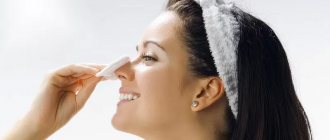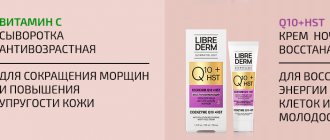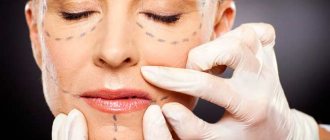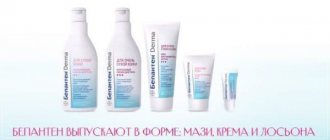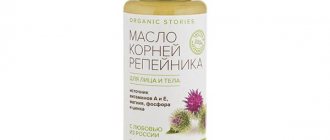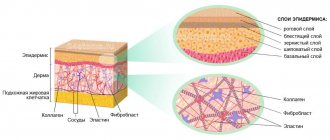From this article you will learn:
- what vitamins are important for facial skin,
- how to use vitamin E capsules for the face,
- how to choose the right anti-aging cosmetics with vitamins.
How important are vitamins for facial skin? They play an important role in collagen synthesis, maintaining skin elasticity and hydration, and protecting it from adverse environmental factors such as free radicals and solar radiation.
Solar radiation is one of the main factors of skin aging. It has been proven that solar UV radiation destroys collagen and also inhibits the activity of fibroblasts that produce collagen, elastin and hyaluronic acid in the dermal layer of the skin. A special term was even coined for these processes – skin photoaging.
By about 40 years, the number of collagen fibers in the skin decreases by about 2 times, which directly affects the firmness and elasticity of the skin. Also, by this age, the amount of hyaluronic acid contained in the skin decreases by 40%, which leads to a decrease in skin hydration and thickness, and also reduces the degree of hydration of collagen fibers with water, which further reduces the firmness and elasticity of the skin.
Vitamins help reduce the negative impact of the external environment on the skin, and also activate metabolic processes in the skin. Numerous studies have shown that the most essential vitamins for beautiful skin and hair are vitamins A, C, E, K, as well as the B complex of vitamins.
The main effects of vitamins used in cosmetology –
- Vitamins A and C - can increase the production of collagen and elastin in the skin, thereby increasing skin elasticity.
- The combination of vitamins C and E perfectly protects the skin from the harmful effects of ultraviolet radiation, preventing the process of photoaging of the skin.
- The combination of vitamins A and K effectively fights dark circles under the eyes.
- Vitamin C together with vitamin B5 - perfectly heal skin damage.
Below we will look at the 5 most important vitamins for facial skin, and also tell you what functions they perform and give examples of high-quality cosmetics based on them.
Vitamin E for face –
Research shows that vitamin E is a very powerful antioxidant that helps reduce free radical damage to the skin. As is known, the latter play a big role in the aging process of the body. Vitamin E for facial skin actively fights free radicals and, as a result, prevents early aging.
Research has shown that vitamin E is also effective at absorbing harmful ultraviolet rays from the sun. In addition, cosmetic products containing a combination of vitamin E and vitamin C have been shown to be more effective in protecting against the sun than products containing either vitamin alone (link to study).
Scientists have also found that vitamin E can accumulate in the epidermis (the surface layer of the skin). This leads to an increase in the hydrophobic properties of the epidermis, i.e. the evaporation of moisture from the surface of the skin will decrease and, thus, its hydration will increase. That is why vitamin E for the face - reviews from cosmetologists confirm this - is a desirable component in any moisturizing cream.
Thus, vitamin E for the skin allows -
- protects against UV rays,
- has powerful antioxidant properties,
- has an anti-inflammatory effect,
- helps in the fight against wrinkles and fine lines,
- moisturizes and softens dry skin,
- reduces the risk of cell mutation and skin cancer development.
Forms of vitamin E - there are several forms of vitamin E, but the most biologically active and safe form is alpha-tocopherol (synonyms - “alpha-tocopherol acetate”, “alpha-tocopheryl acetate”). The use of this form is recommended by the FDA. This form is natural (natural).
There are also synthetic forms of vitamin E, which are synthesized from petroleum products. Such forms are less active and safe. They will be indicated in the instructions of cosmetic products with the prefix “DL”, for example, “dl-tocopherol” or “dl-tocopheryl acetate”.
On the Internet you can find many different ways to use vitamin E for your face at home, because... it can be bought cheaply at any pharmacy, and its benefits for the skin are enormous. That is why vitamin E for facial skin - reviews from cosmetologists and patients confirm this - must be in the cosmetic bag of any woman who takes care of her appearance. Below we will tell you how to use vitamin E capsules for the face and skin around the eyes...
How to use vitamin E for dry and sensitive skin –
Those with dry and sensitive skin know how important and difficult it is to find the right ingredients to keep your skin healthy. Vitamin E is one of the few that can be used effectively without buying expensive serums and creams. At the pharmacy you can freely buy bottles or capsules containing an oil solution of vitamin E inside (Fig. 3-5).
Vitamin E for the face: how to use
- Warm it in your hands and then squeeze out 1-2 capsules of vitamin E.
- Apply with light massaging movements onto the skin.
- It is best to do this in the evening (before bed).
How to use vitamin E for the skin around the eyes –
Vitamin E capsules can perfectly replace expensive eye cream. However, remember that pure vitamin E is a potential allergen, and therefore can cause severe allergic reactions when it comes into contact with the mucous membranes of the eyelids (24stoma.ru).
Gently squeeze 1 capsule into the palm of your hand and apply the contents around the eyes using the pad of your ring finger. Use patting, as if driving, movements, because... This is least likely to injure the delicate skin of the eyelids. It is best to apply vitamin E to the skin around the eyes at night and not wash it off until the morning.
Vitamin E face mask –
There are a huge number of recipes for vitamin E masks that you can prepare at home. Below are the most popular of them.
- Honey mask with vitamin E for dry skin – take a teaspoon of honey, add 2 capsules of vitamin E to it, mix well. Then apply this mixture to your face and décolleté. Leave the mask on for 20 minutes and then rinse with warm water. This mask can be done 2-3 times a week.
- Anti-wrinkle mask with avocado and vitamin E –
First mash half a fresh ripe avocado and then add 2 vitamin E capsules and mix well. After this, apply this paste on your face and neck, leaving this mask on for 15-20 minutes. At the end of this time, rinse it off with warm water.
Vitamin E for chapped lips –
During winter, lips often become chapped and cracked, causing very painful sensations. With the help of vitamin E, you can not only quickly heal cracks on your lips, but also moisturize your lips well, thereby preventing further damage to the skin of your lips.
How to use –
- Apply the contents of 1 vitamin E capsule to your lips,
- It's best to do this at night,
- Avoid licking your lips, because... this will prevent the vitamin from being absorbed into the skin.
Myths about vitamins
Vitamins for skin
Surprisingly, from the age of 25 the process of skin aging begins. Drooping of the eyelid (ptosis), small wrinkles on the face appear due to a decrease in the production of collagen and hyaluronic acid, which are companions of youth. The issue of maintaining healthy and youthful skin must be approached comprehensively. Cosmetic procedures will be much more effective if you add internal effects to them. Additional intake of vitamins and minerals for the skin will enhance the positive results from the use of high-quality cosmetics and hardware procedures.
All the necessary vitamins for the skin and their effects
Biologically active supplements and vitamin-mineral complexes are used today to prevent a whole range of diseases. The introduction of vitamins into the diet helps maintain skin health, prevent and slow down its aging.
Key vitamins for facial skin:
- Vitamin A. Vitamin A plays an important role in the human body; one of its main tasks is to participate in metabolism and improve cell regeneration. It accelerates skin renewal processes, improves protective function and allows it to maintain the water balance necessary for smoothness and tone. With a sufficient amount of vitamin A, the production of the main building materials of the skin - elastin and collagen - increases. This is what allows you to maintain a pleasant complexion and slow down the appearance of wrinkles.
- Vitamin E is a group of compounds consisting of tocopherols. Together with vitamins A, D and K, it belongs to the fat-soluble group. Vitamin E is popularly called the “vitamin of youth”. It not only slows down the aging process and relieves irritation, but also neutralizes free radicals thanks to its antioxidant properties. In addition, it has nourishing and moisturizing properties, helping to retain moisture in the skin. In the presence of dermatological disorders, vitamin E is one of the first to come to the aid of damaged skin.
- Vitamin B3 or PP (niacin) or in other words nicotinic acid is a water-soluble B vitamin that has a positive effect on many body systems, including the nervous and endocrine systems, promoting their proper functioning and the production of sex hormones, cortisol, thyroxine and insulin, deficiency of which negatively affects the condition of facial skin. The effect of nicotinic acid on the epidermis is a recent discovery by scientists. The main advantage of niacin is its lifting effect, which is not achieved by other vitamins. Nicotinic acid helps neutralize swelling.
- Vitamin D3. Vitamin D3 is a fat-soluble compound. It is generally accepted that its effect is associated exclusively with the prevention of rickets and osteoporosis. However, its effect on the body is much broader. It promotes the production of collagen, a dramatic decrease in which is observed in women during menopause. Collagen slows down the aging process, gives the skin radiance and a healthy appearance.
- Vitamin B1 (thiamine). Vitamin B1 has a significant effect on the functioning of the nervous system and muscle tone. It is worth noting that thiamine is also necessary for the epidermis. Peeling, irritation and fine wrinkles are indicators of thiamine deficiency. Vitamin B1 helps prevent acne and hair loss.
- Vitamin B2 (riboflavin). A vital vitamin for the normal functioning of all body systems. Riboflavin is the key to healthy skin. It supports respiratory and nutritional processes in the cells of the epidermis, allowing the skin to maintain youth for a long time. Vitamin B2 makes it possible to forget about acne and dryness.
- Vitamin C (ascorbic acid). It is a powerful antioxidant that promotes collagen production. Thanks to its effect, the skin becomes elastic and less prone to pigmentation. Vitamin C prevents the formation of melanin, which protects the skin from ultraviolet radiation and, as a result, from the formation of age spots. An interesting fact is that vitamin C cannot be produced independently in the human body. That is why its regular use is necessary for modern man.
Microelements are the key to healthy skin. The following microelements help maintain its attractive appearance:
- Zinc. An important trace element for humans. It is directly related to metabolism in the human body (proteins, fats and carbohydrates). It is part of all cells of the body and takes part in the formation of cellular mediators. The antioxidant properties of zinc help accelerate skin restoration processes; the microelement also reduces the severity of wrinkles and sagging skin.
- Magnesium. Having an optimal level of magnesium in the body makes it possible to guarantee the health of the epidermis. It directly affects the process of adequate hydration inside cells (the so-called cytosol) and participation in several enzymatic reactions at the molecular level. Magnesium helps eliminate flaking, relieve itching, and soothe irritation associated with acne or allergic rashes.
- Selenium. The trace element is an integral component of metabolic processes at the cellular level. The proper functioning of most enzymes also depends on the regular intake of selenium into the body. Its main function is to slow down the aging process throughout the body, in particular in the skin. Combined with vitamin E, selenium is a powerful antioxidant that prevents skin cell damage and helps slow down the aging process.
- Manganese. It has a nutritional effect and is involved in many vital processes in the body, for example, in the processing of carbohydrates and proteins. It is impossible not to take into account the fact that the formation of bone and cartilage tissue in the body is impossible without the presence of manganese. A lack of magnesium in the body is manifested by redness and pigmentation on the skin.
- Iron. Constant fatigue is the first alarm bell indicating iron deficiency. It affects the processes of energy production and detoxification. It also counteracts free radicals, protecting the skin from premature aging.
All of the above vitamins and minerals for the skin are contained in the Vitrum® Beauty Plus complex. An integral part of the complex are herbal components: horsetail extract, kelp, peppermint, anise, lavender. It was not by chance that herbal supplements were included in the complex; they have a number of different properties. For example, rosemary leaf extract and lavender herb help remove excess fluid from the body and reduce swelling, cinnamon tree bark extract helps normalize digestion, and ginger extract relieves menstrual pain. Some plant extracts are a natural source of silicon, which further stimulates collagen production.
Causes and types of skin aging
What causes skin aging? Why do pigment spots and wrinkles begin to appear and skin tone lose?
- Lack of moisture. The water-lipid mantle is located on the surface of the skin and is a protective barrier. In youth, lipids are produced in the required quantities. Even in the presence of unfavorable external influences, the mantle actively and independently regenerates. With age, the level of lipid production stops, as a result, wrinkles, peeling and dull complexion appear.
- Exposure to free radicals. They are molecules with increased oxidative capacity. Radicals negatively affect collagen molecules, as a result of which it loses its properties, so necessary for maintaining youthful skin. Daily intake of antioxidants can combat the effects of free radicals.
From about 25 years of age, there is a decrease in collagen production. Each subsequent year its concentration decreases by 1%.
- Exposure to ultraviolet radiation. Sun rays are an irreplaceable source of vitamins D. But prolonged exposure to ultraviolet radiation on the skin leads to photoaging, which affects the deep layers of the epidermis. As a result, the formation of age spots, the appearance of wrinkles and rosacea.
The main types of skin aging are:
- "Tired". This type of aging is characterized by swelling of the face and area around the eyes, and the presence of small expression wrinkles.
- "Finely wrinkled." Skin aging of this type is invariably accompanied by dryness and the appearance of wrinkles around the lips and eyes. An increase in pores is observed.
- "Large-wrinkled." The change in the oval of the face is clearly expressed, a double chin and nasolabial folds appear, as well as deep eyebrow wrinkles.
- "Combined". Includes most of the signs characteristic of the first three types of aging.
- "Muscular." Accompanied by the appearance of nasolabial wrinkles and folds on the eyelids.
- The relief of the face increases.
What vitamins and microelements help maintain skin elasticity and health? Vitamin complexes used for this purpose should include vitamin A, B, C, as well as selenium, zinc, and iron. The Vitrum® Beauty Plus complex contains 13 vitamins necessary to maintain skin tone, more than 9 minerals and 14 herbal complexes.
What foods contain vitamins and minerals that are good for the skin?
The most beneficial vitamins and minerals for the skin are found in foods that should be included in your daily diet:
- Vitamin A: fatty fish, liver, eggs, carrots, red apples.
- B vitamins: beef, pork, legumes, bananas, almonds, tomatoes.
- Vitamin C: pineapple, orange, broccoli, strawberry, papaya.
- Vitamin E: sunflower, peanut oil, fish oil, eel.
- Vitamin D: dairy products, as well as eggs, sardines, salmon.
The skin needs not only vitamins, but also minerals, the most useful of which can be found in the following products:
- Zinc: barley, peanuts, pistachios, buckwheat, pork.
- Magnesium: soy, cashew, seaweed, oats.
- Selenium: pink salmon, beans, sunflower seeds, cottage cheese.
- Iron: oysters, beef liver, beans, peas.
In addition to signs of aging, many women are concerned about the appearance of dry skin and the associated discomfort, which negatively affects the external condition of the epidermis. That is why many are interested in the question: “What vitamins should I take if my body skin is dry?” Vitamins A, E, B and C are the main helpers in solving this problem.
It is extremely difficult to obtain from food all the vitamins and microelements necessary for the skin, since a person would have to eat kilograms of food every day.
Taking the Vitrum® Beauty Plus complex helps the body receive the vitamins and minerals necessary to maintain healthy skin. Back
Vitamin A -
Vitamin A can most often be found in anti-aging cosmetics, because with long-term course use (about 24-36 weeks) it has the following effect on the skin...
- gives the skin an even color and texture,
- stimulates collagen production,
- reduces the depth of wrinkles and fine lines,
- reduces pigment spots,
- and also fights acne (blackheads and pimples).
There are several forms of vitamin A that have varying effectiveness. These include: retinol, retinol esters (for example, retinol acetate), retinaldehyde, trans-retinoic acid, 13 cis-retinoic acid, etc.
Products based on pure retinol, and especially retinol acetate, will be much weaker than products containing retinaldehyde or retinoic acid. However, it is retinol that is most often used in anti-aging cosmetics, because it causes significantly less skin irritation. Unfortunately, choosing a high-quality cosmetic product with retinol is very difficult, because... Many manufacturers use cheap vitamin A substances (retinol esters) rather than pure retinol or retinaldehyde.
Products based on retinoic acid will most strongly stimulate collagen synthesis and reduce the depth of wrinkles, however, as we have already said, they cause severe skin irritation (dryness, redness, itching), especially at the beginning of use. Anti-wrinkle products based on retinoic acid include:
- Tretinoin,
- Isotretinoin
- Retin-A.
Examples of high-quality creams and serums with retinol -
For more information about the effect of retinol on facial skin, how to choose the right cosmetics with retinol, what concentration these products should have, as well as the rating of the best products with retinol, read the following articles:
- “Rating of the best anti-aging cosmetics with retinol”
- “How to properly use cosmetics with retinol on the skin of the face”
How to understand what vitamins your skin lacks
Nutritional deficiencies cannot be asymptomatic. In this case, the condition of the epidermis changes and worsens. At the same time, the skin will react differently to a lack of vitamins, depending on which particular substance is missing.
“First of all, the skin reacts to a lack of vitamins with a dull or altered complexion,” notes Svetlana Bondina, “flabbiness, premature appearance of wrinkles and increased dryness.”
The “marker” signs of a lack of a specific nutrient will be the following symptoms.
- Ascorbic acid (C). If there is a lack of it, the rate of wound healing is disrupted, and hemorrhagic lesions (sudden appearance of bruises without previous injuries) may occur.
- Biotin (B7). It manifests itself as hair loss and perioral dermatitis - chronic inflammation of facial tissues.
- Pyridoxine (B6). If the skin of the face lacks this vitamin, it will respond with severe peeling and a red rash. Seborrheic dermatitis develops, which also leads to the appearance of profuse dandruff.
- Niacin (B3). This results in the development of pellagra. This is the name for a skin disease, which is manifested by increased sensitivity of the epidermis to sun exposure and the appearance of pigmentation. Areas exposed to sunlight are affected.
- Riboflavin (B2). Its deficiency is characterized by pale skin, the formation of cracks in the corners of the mouth and in the lip area. A characteristic symptom is the formation of red, itchy spots on the ears, eyelids and around the nose.
“These signs alone are not enough to diagnose nutrient deficiency,” notes Svetlana Bondina, “since some of them can be observed even with sufficient levels of substances in the body. To clarify which vitamins to take for the skin, you need to consult a doctor and, if necessary, laboratory confirm their deficiency or excess.”
To choose a drug, you need to consult a doctor (Photo: pexels.com)
Use of vitamin C –
Everyone knows that this vitamin is a strong antioxidant, but its properties do not end there. For example, numerous clinical studies have confirmed the effect of vitamin C on the synthesis of collagen and elastin fibers. We can say that after vitamin A, vitamin C is the most important vitamin for maintaining the good condition of our skin.
Effects of Vitamin C on Skin –
- protects skin from ultraviolet radiation,
- protects skin from free radicals,
- participates in the synthesis of collagen fibers,
- reduces the depth of wrinkles,
- reduces pigmentation on the skin,
- stimulates skin cell regeneration.
The term “vitamin C” (as well as vitamin A) does not mean one specific molecule, but a whole group of substances, which include: L-ascorbic acid, sodium ascorbyl phosphate, magnesium ascorbyl phosphate, ascorbyl palmitate, sodium ascorbate and others.
The most effective form of vitamin C is L-ascorbic acid. The remaining substances are only its predecessors, i.e. they turn into it after application and absorption into the skin. Below we have given examples of high-quality products with vitamin C (Fig. 11-13) -
To learn how to choose and apply anti-aging cosmetics with this vitamin correctly, read the article: “Rating of 2022 products with vitamin C”
Research into the effect of vitamin C on collagen synthesis has led to an explosion in the number of cosmetic products containing this vitamin. Many patients leave rave reviews about such cosmetics, while others do not see its effectiveness at all. What is this connected with?
It turned out that not only the form of vitamin C in the product is very important, but also its concentration, and even the pH of cosmetics. No less important is the manufacturing technology (stabilizing vitamin C) so that it does not disintegrate from air and light even before applying the cream or serum to the skin.
Pure retinol -
Real retinol, and not its esters, is already found in not too many cosmetic products. Moreover, very often manufacturers resort to deception - on the packaging in large letters they write that the product contains retinol, and in the ingredients in small print they may already write about retinol palmitate. The most important thing you should know about cosmetics with pure retinol is its concentration. Let's figure out which concentrations are effective.
1) Effective concentration of retinol –
We have already said above that the most effective form of vitamin A is “retinoic acid” (tretinoin). There are a large number of clinical studies that show that the optimal therapeutic concentration of tretinoin for the treatment of aging skin is 0.025%. And this is exactly the concentration recommended by the FDA (the most authoritative organization in the world that studies the effectiveness of pharmaceuticals and treatment methods). And as you will see below, this has a direct bearing on retinol.
Evidence base: 1) study “Griffiths CE, Kang S, Ellis CN et al. Two concentrations of topical tretinoin cause similar improvement of photoaging but different degrees of irritation." The study followed patients over 48 weeks and concluded that using a lower 0.025% tretinoin concentration for skin aging treatment had exactly the same effects as a higher 0.1% concentration. This is how the effective therapeutic concentration was determined.
2) Study “Olsen EA, Katz HI, Levine N et al. Tretinoin emollient cream: a new therapy for photodamaged skin. J Am Acad Dermatol 1992" shows that the use of products with tretinoin concentrations below 0.01% was not very effective. In this case, there was no significant difference in the condition of the skin before and after. And this also has a direct bearing on the effective concentration of retinol.
Important: the fact is that 0.1% pure retinol is approximately equivalent in effectiveness to 0.0025% tretinoin. It turns out that the 0.025% concentration of tretinoin recommended by the FDA for the correction of aging will correspond to 1.0% of pure retinol. That is why the world's leading manufacturers of anti-aging cosmetics with retinol, SKINCEUTICALS® and ZO® SKIN HEALTH, have products with 1.0% pure retinol in their lines. And these products are intended specifically for the correction of wrinkles in older patients.
Products with 0.3% pure retinol are suitable for correcting fine lines, as well as increasing skin elasticity, evening out skin tone and texture (products with 0.5% should add shallow wrinkles to the above). In addition, products with 0.1-0.3% pure retinol are suitable for correcting wrinkles in the corners of the eyes (while the 0.1% concentration is suitable for daily use, and 0.3% - only 3 times a week). The fact is that the skin around the eyes is thinner and more sensitive, and therefore lower concentrations will be effective here.
In addition, a 0.1-0.3% concentration can be used to prevent aging, as well as to acclimate the skin to retinoids (as a preparation before using a more concentrated 1.0% form of pure retinol).
2) Duration of use of retinol –
The study (“Two concentrations of topical tretinoin cause similar improvement of photoaging but different degrees of irritation” Griffiths CE, Kang S, Ellis CN et al.) shows that to achieve significant correction in older patients, the course of treatment should be at least 48 weeks . If we are talking about an average correction, the duration of the course should not be less than 36 weeks. And in any case, for any patients, the course should not be less than 24 weeks.
But there is one exception. Products with retinol can be prescribed for preparation before hardware rejuvenation methods, such as fractional RF lifting or laser resurfacing. In this case, even a 2-3 month course of pure retinol can significantly increase the effect of hardware methods. If you want to be guaranteed to get a pronounced anti-aging effect, and sooner than after 1 year, then the following scheme is suitable.
Carry out a course of 3 months with effective concentrations of pure retinol, after which do several fractional RF lifting procedures. These can be the following devices - 1) the “Venus Viva” device with a special “NanoFractional RF” applicator included in the kit, 2) a special tip for fractional grinding “Sublative RF”, which comes with the eTwo™ and Elos Plus™ devices. And it will be very effective.
3) Retinol microencapsulation technology –
If we talk about retinol esters, although they are not very effective, they have good stability. Those. the retinol in them is not destroyed by exposure to light and air. But pure retinol is quickly destroyed by both. Therefore, high-quality manufacturers use microencapsulation (or liposome) technology to stabilize pure retinol. In these cases, pure retinol molecules will be hidden in microcapsules or liposomes.
This protects pure retinol from degradation. When such technologies did not yet exist, high-quality manufacturers produced their products with pure retinol - only in opaque containers with a pump (dispenser). If retinol comes encapsulated, then such a dispenser is no longer needed. In addition, retinol in microcapsules has another excellent property - it significantly reduces the risk of skin irritation, which often occurs when using retinoids.
Important: many manufacturers of inexpensive cosmetics may not indicate the concentration of retinol at all. In addition, most manufacturers use non-encapsulated pure retinol in a cream or serum - and the product can come in a container without a dispenser, or in a transparent bottle (serum). Please note that if a manufacturer uses stabilized retinol in microcapsules or liposomes, this will always be written on the packaging. But don’t be confused: sometimes manufacturers write that their product contains a stable form of retinol, but we are talking about retinol palmitate, and not stabilized pure retinol (24stoma.ru).
B vitamins for beautiful skin and hair –
Research published in 2003 by the Academy of Dermatology showed that the use of B vitamins in creams and serums for facial skin significantly reduces the effects of aging and fading of facial skin (research - Chung JH, Hanft VN, et al. “Aging and photoaging. " J Am Acad Dermatol. 2003 Oct;49(4):690-7").
The most important B vitamins for the skin...
- Vitamin B2 (riboflavin) is a very important vitamin for maintaining the condition of skin, nails and hair. Its deficiency leads to dry skin, cracks in the corners of the mouth, early skin aging, as well as dry and brittle hair and nails.
- Vitamin B3 (niacin) – improves the ability of the upper layer of the epidermis to retain moisture.
It helps dry skin look softer, smoother, and reduce fine lines on the face. Also used with other skin whitening products for pigmentation. Using B3 together with vitamin A (retinoids) gives even better results in the fight against wrinkles. But a lack of B3 leads to dry skin, a lack of nutrition to the hair follicles, and as a result leads to increased fragility and split ends of the hair.
- Vitamin B5 (pantothenic acid) – helps fight acne by reducing sebum production. Vitamin B5 also promotes faster regeneration of skin cells, but this effect is especially pronounced when vitamins B5 and C are combined.
- Biotin (vitamin B7) – is involved in the synthesis of collagen fibers, which form the basis of skin, nails, and hair. Its deficiency can lead to dry and itchy skin, dermatitis, hair loss, and seborrhea of the scalp.
- Vitamin B12 (cyanocobalamin) – helps regulate skin pigment production and prevents hyperpigmentation.
Below we have provided examples of quality and trustworthy creams and serums with B vitamins...
Serum InstaNatural® “Niacinamide Vitamin B3 Serum”
Vitamin B3 serum (Fig. 14) from InstaNatural contains: 5% vitamin B3, hyaluronic acid, vitamin E, aloe Vera, avocado oil, rosemary oil and other active ingredients. The soft gel-like texture of the serum is easy to apply and quickly absorbed.
According to reviews, this serum -
- reduces the appearance of acne,
- tightens the pores on the face,
- reduces the depth of fine lines and wrinkles,
- whitens age spots and age spots,
- perfectly moisturizes the skin,
- makes the skin firm, elastic and soft.
Reviews from patients noted that after using this serum, the skin actually became more hydrated, elastic and smooth, many noted a decrease in the appearance of fine wrinkles due to the evenness of skin texture and tone. The cost of InstaNatural Niacinamide Vitamin B3 Serum is about 1,600 rubles (per 60 ml package).
SkinCeuticals® Hydrating B5 gel –
Super moisturizing and regenerating gel “Hydrating B5 gel” from SkinCeuticals (Fig. 15) - contains a high concentration of hyaluronic acid enriched with vitamin B5. The manufacturer claims that this serum perfectly moisturizes the skin, activates cell regeneration, eliminates the feeling of tightness, and also makes the skin elastic and dense. The price of SkinCeuticals Hydrating B5 gel will be from 4,700 rubles per 30 ml bottle. You can buy it in the company's Russian online store.
Before applying the serum, it is recommended to warm it up on your fingertips so that it is better and faster absorbed into the skin. Reviews noted that after using this serum, the skin became softer, wrinkles decreased with prolonged use, the overall appearance of the skin improved, the skin became radiant and moisturized.
By the way, this product has an exact copy from, which is called “Hydra B5 Gel – advanced formula” (Fig. 16). Despite the fact that this is a “generic”, the company that produces it is quite well-known and of high quality. The cost of this product will be approximately 2,200 rubles ($32), but you can only buy it in online stores such as Amazon or Ebay.
Olay Total Effects 7-In-1 Cream –
Olay “Total Effects 7 in 1” cream (Fig. 17) - contains a large number of emollient ingredients, such as coconut oil, soybean oil, vitamin B5, hydrolyzed wheat protein, ascorbyl palmitate, green tea, vitamin B3. This cream is an excellent facial moisturizer that can be safely used every day. There is a day and night version of the cream.
Reviews noted the good absorption of the cream and excellent skin hydration after use. The skin became soft, elastic, silky. The cost of Olay Total Effects 7 in 1 is about 700 rubles.
How to use face cream with retinol
It is better to use a rejuvenating complex with retinol in the autumn-winter period, since at this time the skin's sensitivity to ultraviolet radiation decreases. The first attempts to apply the product may be accompanied by slight redness of the face and tingling - this is a temporary reaction of the dermis to vitamin A. Gradually the skin will get used to it and the effect will appear.
There are both day and night creams with retinol. The best effect can be obtained if you use nighttime options - these products contain more vitamin A. In daytime analogues, the concentration of the active component is negligible, but they additionally contain ingredients for UV protection.
Vitamin K for skin –
It is believed that the cause of dark circles under the eyes is fragile capillaries that burst and show through thin skin. Vitamin K applied to the skin, as studies and patient reviews have shown, reduces dark circles under the eyes, and also reduces the appearance of bruises and bruises. But the combination of vitamins K and A in face creams fights dark circles under the eyes even more effectively than vitamin K alone.
One study confirmed that after 4 months of constant use of a cream with vitamin K and retinol (vitamin A), the dark circles under the eyes of subjects significantly lightened. Researchers were unable to definitively answer which of the two vitamins contributed to this: retinol thickens the under-eye area, making it less transparent, and vitamin K has a brightening effect, making dark circles less noticeable. Moreover, retinol increases the ability of vitamin K to penetrate the skin and interact with cells.
We hope that our article: Vitamins for facial skin reviews was useful to you!
What vitamins should you take to improve your facial skin?
According to the doctor, all the substances the body needs can be obtained from food. And if a person eats a balanced diet, he does not need to receive nutrients in the form of vitamin complexes.
If there are “excesses” in the diet, for example, sharp restrictions in the choice of products while following a strict diet, a vegetarian diet, it is important to check with the doctor which vitamins are best for the skin during this period, and take strictly the drug that will be prescribed.
It is impossible to eliminate a deficiency if it has already developed using diet alone. But you can correct the aesthetic imperfections of your face by including certain foods in your diet.
For dry skin
Sources of vitamins E, B7 and B6 are needed, including unrefined oils, meat, and egg liver. They help with dry skin of the face and body, help moisturize it, and protect against peeling.
For oily skin
For her, foods rich in vitamin A of both animal and plant origin will be a real salvation. Dairy products, fish, liver, butter, as well as legumes and carrots will reduce the likelihood of developing problems in the form of rashes and acne.
For radiant skin
If you have a dull complexion, you need to include sources of ascorbic acid and cobalamin in your menu. These are plant products (fresh fruits, berries and vegetables), as well as animal products: meat, liver, seafood.
For aging skin
It is impossible to stop the aging process, but it is possible to slow down and smooth out its manifestations. Nutrients with pronounced antioxidant properties, in particular vitamins A and C, help with this. The first is found in large quantities in animal products, and the second is found only in plant-based and non-heat-treated ones. After 50 years, their content in the diet cannot be reduced.
For acne
If you are concerned about rashes, you should increase your consumption of foods rich in vitamin A. If the effect of the diet is not noticeable, you should consult a dermatologist. To correct the problem, systemic retinoids are used - active forms of nutrients intended for oral administration.
Medicines prescribed by a doctor according to indications and for a diagnosed problem will be effective and help in solving it. But choosing vitamin complexes for facial skin in a pharmacy on your own, much less buying them in the form of dietary supplements, makes no sense.
“Dietary supplements do not undergo such strict control as medicines,” clarifies Svetlana Bondina. “Their effectiveness has not been proven.”
Dietary supplements will not be effective (Photo: pexels.com)
Retinol: reviews and instructions for use
To date, only 2 components of cosmetics have evidence of effectiveness against facial wrinkles. Firstly, these are retinoids, which include retinol, retinaldehyde and tretinoin, and secondly, pure 10-15% L-ascorbic acid. The FDA believes that these are the only ingredients in cosmetics that actually affect collagen production in the skin, and any doctor will tell you that if the FDA recommends something (and this does not happen often), then it really works.
Tretinoin (trans-retinoic acid) is the most active form of vitamin A, and this drug at a concentration of 0.025% allows you to achieve significant skin rejuvenation. But preparations with tretinoin have an irritating effect on the skin, and their use often results in dryness, redness, and peeling of the skin (especially in the first weeks of use). Therefore, over time, the cosmetic industry began to use milder forms of retinoids - such as pure retinol and retinaldehyde (retinal).
How to use retinol for facial skin (instructions):
Planning –
It usually takes 2-4 weeks for the skin to adjust to retinol. During this period, redness, dryness, peeling, itching and burning of the skin may occur, which is especially typical for people with sensitive and/or dry skin. To reduce the risk of side effects, at the first stage you should use products with lower concentrations, or follow the following recommendations for use.
For example, during the first week you can use your product only 2 times, the next 2 weeks - use it only 3 times, then switch to the “every other day” mode. But your goal is to gradually reach a daily use regimen. The frequency of use greatly depends on the skin type and the initial concentration of the product. Therefore, some patients can immediately start using it every other day, i.e. This is all quite individual. If on any day you notice severe redness of the skin, then do not use the product for several days (then slightly reduce the frequency of use).
Is it possible to use retinol in summer?
In the summer, you can also use retinol, but then in parallel you must use sunscreen with SPF 50. If you decide to start using retinol during the heating season, then it is advisable to monitor the humidity in the room, because low air humidity + retinol will definitely lead to more pronounced side effects, which we described above. An excellent product with SPF 50, which is one of the few that can be applied even to the eyelids, is “Anthelios Shaka Fluid” from La Roche-Posay.
Conduct an audit of cosmetic products -
Get rid of any cosmetics while using retinol that have even the slightest irritating effect. For example, it will not be possible to use -
- scrubs and chemical peels,
- alcohol-based tonics,
- products that dry the skin
- It will also be impossible to wax depilation on areas of the skin treated with retinol.
Particularly sensitive areas of the face -
If you are using a product with a high 1.0% concentration of pure retinol, then avoid getting the product on the skin near the wings of the nose, the red border of the lips, and the area around the eyes. These are particularly sensitive areas where such concentrations can cause burns. If you use a 0.3% concentration, then it can even be applied around the eyes (only on the fixed part of the eyelids), but this concentration can only be used around the eyes 3 times a week. Even smaller concentrations can be used around the eyes daily.
When to apply retinol products -
Retinol products are applied only once a day, preferably in the evening or before bed. Before applying retinol, the skin of the face should be washed with a mild cleanser and then dried very well. After washing, you should wait at least 5 minutes. If you apply products with retinol to insufficiently dry skin, this will greatly irritate it (dryness, flaking, etc.). We hope that our article: Retinol for facial skin reviews was useful to you!
Sources:
1. Higher medical education of the author of the article, 2. Textbook of dermatology “Fitzpatrick's Dermatology” (8th edition), 3. American Academy of Dermatology (USA), 4. “Cosmetic dermatology” (Bauman L.). 5. Clinical studies published at https://www.ncbi.nlm.nih.gov/.
Contraindications and side effects of retinol
If we are talking about forms of retinol that are not herbal, then you should be aware of the contraindications and side effects of this component.
Contraindications:
- pregnancy,
- chronic pancreatitis,
- cholelithiasis,
- acute chronic nephritis,
- cardiac decompensation,
- hypervitaminosis A,
- cirrhosis of the liver,
- viral hepatitis,
- sensitivity of the skin.
Side effects:
- skin irritations,
- allergic reactions,
- genetic mutations of the fetus,
- burns,
- hyperpigmentation,
- thinning of the skin,
- itching,
- peeling and tightness of the skin,
- hyperemia of the skin.
Please note that the skin needs to adapt to retinol and start care with low concentrations.
